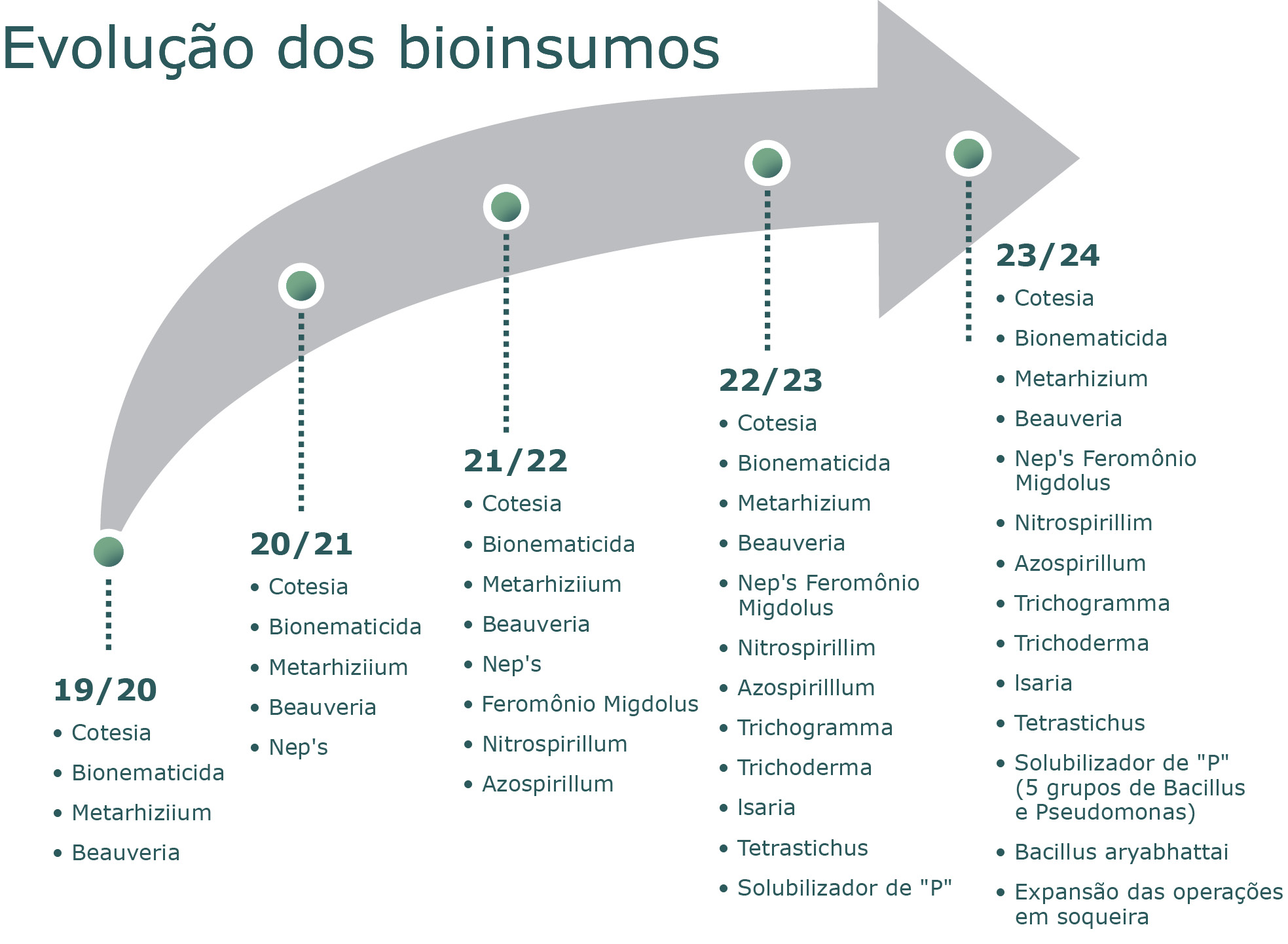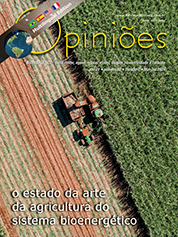Rogério Augusto Bremm Soares
Agricultural Director at BP Bunge Bioenergia
OpAA80
The contributions of bioinputs to sustainability
The bioenergy sector, as well as Brazilian agribusiness, has undergone a real transformation in recent years. And regenerative agriculture is at the center of this process, as this practice combines the possibility of delivering high performance to agricultural operations while presenting a promising approach to facing sustainability challenges that today concern and mobilize the entire world.
Regenerative management practices are used with the aim of increasing productivity through processes that, concomitantly, reestablish natural systems, thus favoring the recovery of soil health and resilience and increasing biodiversity, as well as preserving the environment.
At BP Bunge Bioenergia we have been working around this topic since the company was founded in 2019, treating as a priority the development and application of solutions and good field management practices aimed at the quality and productivity of sugarcane fields, with an approach aligned with commitments to sustainability that make up our environmental, social and corporate governance agenda.
As a result, in four years, we invested more than 300 million reais in initiatives related to the subject, with prospects for evolution in the coming years, and became a reference in regenerative agriculture in our sector. The gains already recorded are numerous, including a reduction in carbon emissions, less dependence on imported agricultural inputs, in addition to an increase in productivity, which is expected to increase by 20% by 2025.
In this universe, an issue that has been particularly highlighted, in the market in general and in our strategies in particular, is the use of bio-inputs. These products based on biological components, including microorganisms and plant extracts, help to enhance environmental gains in agricultural operations by generating significant results, such as combating pests and diseases, advances in terms of nutrition, fertility and preservation of soil biodiversity, also bringing positive impacts in reducing carbon emissions, among other benefits.
In addition to the advancement of bio-inputs used in nutrition, we have made relevant changes in the use of bio-protectants to control pests and diseases, a practice with which we achieved a reduction of approximately 40% in the use of chemical insecticides this harvest. To control fungal diseases, we are moving towards 100% use of biofungicides next year.
Market data shows that the bioinput industry has been achieving important growth in the country. According to the Ministry of Agriculture, Livestock and Supply, in 2013, the registry of bioinputs aimed at controlling pests and diseases in the agency was 107 products, compared to 617 products currently. CropLife Brasil, the entity that represents this segment, indicates that sales of biological products grew 30% in 2023, with the expectation of closing this year with an increase of 35%.
BP Bunge's indicators show that the company has remained at the forefront of this market movement in recent years, having achieved a representative evolution in the use of such products, which went from four varieties in 2019, to prospects of using 14 different types in the harvest 2023/2024. As a result, the expansion of the use of bio-inputs from fungi, bacteria and organic matter has led us to advance in the objective of replacing mineral fertilizers with biological alternatives.
In terms of nitrogen fertilizers, in the 2022/2023 harvest, for example, replacement has already taken place in 100% of the planting area using the bacteria Nitrospirillum amazonense, a solution developed by Embrapa whose bacteria acts on nitrogen fixation, promoting growth and plant development, resulting in increased productivity in crops. With this strategy, the company recorded a gain of around seven tons of sugar per hectare. For the ratoon areas, the company uses the bacterium Azospirillum brasilense in 100% of its area, which, in addition to increasing productivity between 5% and 10%, has already generated a 50% reduction in nitrogen doses.
With regard to phosphate fertilizers, the bacteria that help in the solubilization of phosphorus, such as Bacillus species and Pseudomonas species, have been, since the 2022/2023 harvest, the main responsible for the 15% reduction in the dose of phosphate input applied in planting furrow in 100% of the planted areas. With this, together with the use of composting and natural phosphates from rocks, we reduced the use of MAP in all production by 70%. Furthermore, our team works on different lines of research in the field, looking for alternatives that are even more efficient and that, combined with the use of vinasse, provide more options to optimize the application of fertilizers.
This replacement of mineral fertilizers with biological ones is a process that generates excellent results, as they have a high impact on the carbon footprint. Therefore, ceasing to use products of mineral origin, in addition to reducing costs, contributes to meeting decarbonization objectives. In addition to other initiatives, this practice helped, for example, achieve a 34% reduction in scope 1 emissions in the last harvest, contributing to our goals of combating climate change and sustainable development.
It is also worth mentioning that at BP Bunge we are implementing processes aimed at structuring the company for its own production of these bio-inputs in our 11 units located in five Brazilian states. In this sense, we are progressing in the construction of yards for the production of organomineral fertilizers in all plants, in which by-products from the industrial sugarcane processing process, such as filter cake and ash, are concentrated and enriched with other organic materials, such as animal manure and reactive natural phosphates. With this input, we replace mineral fertilizers purchased externally, generating financial, quality and productivity gains.
Finally, it is important to say that we believe in the company that regenerative agriculture needs to happen on a large scale and, as leaders in the use of biological inputs in our sector, we seek to play another role that we consider fundamental, which is to share the knowledge generated and the technologies we use in our production chain, encouraging our raw material suppliers to increasingly adopt biological and regenerative management in the cultivation of sugar cane, thus contributing to making our sector's operations increasingly efficient and sustainable.





